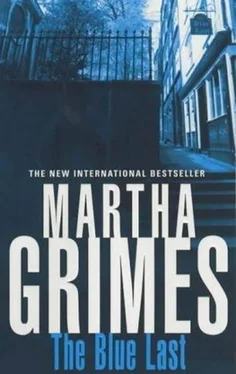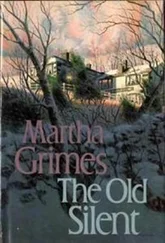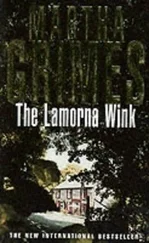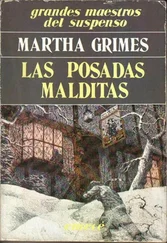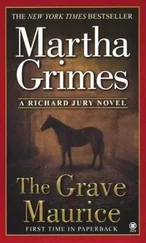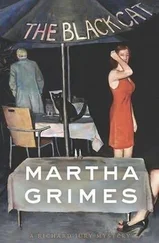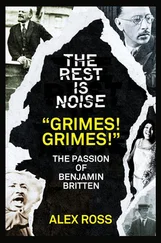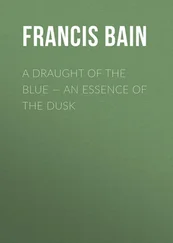Martha Grimes - The Blue Last
Здесь есть возможность читать онлайн «Martha Grimes - The Blue Last» весь текст электронной книги совершенно бесплатно (целиком полную версию без сокращений). В некоторых случаях можно слушать аудио, скачать через торрент в формате fb2 и присутствует краткое содержание. Жанр: Детектив, на английском языке. Описание произведения, (предисловие) а так же отзывы посетителей доступны на портале библиотеки ЛибКат.
- Название:The Blue Last
- Автор:
- Жанр:
- Год:неизвестен
- ISBN:нет данных
- Рейтинг книги:3 / 5. Голосов: 1
-
Избранное:Добавить в избранное
- Отзывы:
-
Ваша оценка:
- 60
- 1
- 2
- 3
- 4
- 5
The Blue Last: краткое содержание, описание и аннотация
Предлагаем к чтению аннотацию, описание, краткое содержание или предисловие (зависит от того, что написал сам автор книги «The Blue Last»). Если вы не нашли необходимую информацию о книге — напишите в комментариях, мы постараемся отыскать её.
The Blue Last — читать онлайн бесплатно полную книгу (весь текст) целиком
Ниже представлен текст книги, разбитый по страницам. Система сохранения места последней прочитанной страницы, позволяет с удобством читать онлайн бесплатно книгу «The Blue Last», без необходимости каждый раз заново искать на чём Вы остановились. Поставьте закладку, и сможете в любой момент перейти на страницу, на которой закончили чтение.
Интервал:
Закладка:
“Thanks, Rich.” Tears stood in Mickey’s eyes. “It means a lot.”
Mickey dying. Mickey dead.
Jury studied the paving stones at his feet as he walked up Ludgate Hill. He walked slowly, almost hesitatingly, thinking it must be like the unsure gait of an aging man. He was too young for this, still, to start thinking of himself as aging, for God’s sakes.
No one occupied these buildings on the weekend except for the City’s caretakers-police, fire brigade, hospital-and the emptiness was partly responsible for this mood.
Then he realized what it reminded him of: a no-man’s-land. Though he had no firsthand knowledge of that area in battle of neutral territory which marked neither advance nor retreat and was claimed by neither side. His father had known, though; his father had talked about it. No, it had been his mother’s account, such a vivid account it seemed to have been his father’s.
I thought it was the work of my own memory. Mickey had said that.
Near St. Paul’s Churchyard he looked for Blackfriars Lane and the construction site. He came upon it almost by chance, given the convolutions of the narrow streets. Material hadn’t been thrown up yet to shroud it, and the cranes and bulldozers and other equipment sat about in the cratered ground like prehistoric Tinkertoys.
He felt he wanted to gather his few memories about him like a coat or a blanket. He wondered how reliable his memory was, or anyone’s memory, come to that.
You could never get what dying was like across to someone else, no matter how intimate the relationship or how sensitive the couple-no matter how able, how willing, how articulate-the sick person is the only one who could possibly know, who could take the measure of it, limn the page, see the borderland.
Maybe it was like walking a beat at two A.M. in a depopulated City. Maybe it was like this and maybe it wasn’t. How would he know? The only one who knew was Mickey himself. No wonder the man looked ill.
And what was the admission to this museum of ravaged portraiture? Nothing. Until dying yourself, you couldn’t get in. Nothing, nada, nil.
He looked down at the place where the Blue Last had once stood and tried to reconstruct it as he did with any crime scene. The customers in the pub, the extra pints bolstering them, Dutch courage, camaraderie.
Jury had no trouble envisioning a building collapsing around him; what he couldn’t imagine is how it had missed him and yet buried his mother. Yet it happened all the time.
And the girl Kitty, stumbling past the matchstick remains of buildings. Half a house sheared off here, another one there, so that you could see in the odd still-standing other half, doorless rooms, a staircase open to view as if it were a dollhouse. But also, at any corner turning, there would be a building left untouched, undamaged as if for pure spite. This would lend the girl hope that the pub had been lucky and had also escaped.
Only it hadn’t, and Kitty set about making her own luck.
Three
On Ludgate Hill, Jury stopped in front of a restaurant that advertised its cappuccino bar. He stood outside dumbly looking in, thinking about Mickey. Would finding out what had happened and to whom, whether the Tynedale granddaughter was who she claimed to be, make Mickey feel connected to earth again?
He walked into the restaurant, deserted except for the help and one woman with dark hair and cold eyes sitting at a table by the window. Jury took a seat at the counter-or bar, he supposed, depending on what you’d come in for. In front of the huge mirror were glass shelves with as good an assortment of liquor as he’d find at any pub.
A pretty waitress with large, dark, soulful-looking eyes came to where he was sitting and took his order for coffee, plain and black. Who did she remind him of? Someone, some actress? Who? She brought the coffee and he sipped it, strong as lye and black as sin, and thought about the morning again. Had it been anyone but Mickey-no. If it had been asked of him in different circumstances by Mickey or anyone else he would have said no. He did not want to dwell on the war again.
“Coffee too strong?” asked the soulful waitress, as if it were all her fault.
“A little, yes.” He broke out a smile to replace what must have been his black-coffee expression.
“It hasn’t been sitting. I mean, it’s fresh, just made.” She shrugged slightly. “Our coffee, it’s just that way.” She gazed at the miscreant cup.
“I could put in some hot water.” Her expression picked up a smidgen of hope.
“No. I’ll tell you what, though. Get me a shot of that.” He pointed to a shelf holding the liquor bottles. “That Glen Grant.”
She took the bottle from the shelf and pulled a shot glass from beneath the bar and poured. “That should liven it up,” she said, pushing the shot glass toward him.
Jury poured it in the cup, sipped, and declared it much improved. Then he asked, “Is it always as empty as this at the weekends?” The only other customer was the icy-eyed brunette. She was smoking what Jury fancied to be the last cigarette in the world.
“Yes, it’s because people don’t live around here, you know. I mean, except for Docklands, but that’s not really the City.”
“If it isn’t, it’s becoming so. All those new condos.”
The brunette made a sign and the waitress moved off toward her table.
Jury took the envelope out of his pocket and spread the pictures, one by one, on the bar. He positioned them as nearly as he could in chronological order: the pub, the au pair, Kitty Riordin, the young woman Alex. He smiled. That was who the waitress reminded him of! He looked at Alexandra Herrick with her baby, Maisie, then at the fighter plane and the sun-blinded young pilot. He stopped, thinking about his father. He had also been RAF, could have piloted that Spitfire, could have been a friend of Ralph Herrick. The faces themselves meant nothing; Jury could not recall his father’s face-how old had he been? But the plane, he could always see the plane spinning toward earth. He had not actually seen it, of course; but in his mind he saw it thus, and there was no one or nothing to correct this vision.
After his mother died, there was the Social, always eager to swoop down and claim another kid. It must have claimed him some time for there was that period in the orphanage. Good Hope, it was called. Funny he’d remember that detail and have lost so many others. First, a kindly uncle had taken him in. He had died and then came Good Hope. Somehow, he had got in his head he was there for five or six years, but now when he tried to call up that period, he wasn’t at all sure-five or six months, it could have been. He saw a row of single beds, the sheets so taut a kid could bounce on them. But he wasn’t bouncing, only sitting on his own bed in a corner. He tried to remember if his feet had reached to the floor; that might have told him how old he was. How long had he been there?
He thought of his cousin in Newcastle, the daughter of the pleasant aunt and uncle, a girl who hadn’t liked him coming into the household. Could his cousin, a bitter woman now, a bitter child then, have put the six years in his head? He could call her and ask; he could even go to Newcastle to try to get some information from her. The husband, a Tyne-and-Wear man, had fallen victim to the North’s unspeakable unemployment rate (the “joke shop” is what they called the employment office), and his cousin had for some obscure reason thought it was in part Jury’s fault, he being a superintendent at New Scotland Yard. Why should Richard be successful and her Bert not?
He signed to the waitress by making a circle over the shot glass with his finger, then over the coffee cup. The coffee was surprisingly good with a jigger of whiskey, but then what wasn’t?
Читать дальшеИнтервал:
Закладка:
Похожие книги на «The Blue Last»
Представляем Вашему вниманию похожие книги на «The Blue Last» списком для выбора. Мы отобрали схожую по названию и смыслу литературу в надежде предоставить читателям больше вариантов отыскать новые, интересные, ещё непрочитанные произведения.
Обсуждение, отзывы о книге «The Blue Last» и просто собственные мнения читателей. Оставьте ваши комментарии, напишите, что Вы думаете о произведении, его смысле или главных героях. Укажите что конкретно понравилось, а что нет, и почему Вы так считаете.
